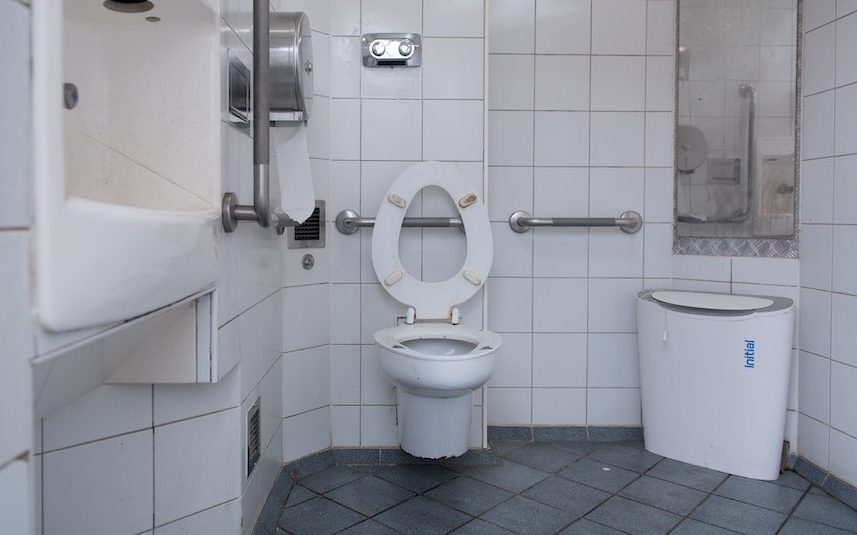
Public toilets. Who hasn’t had the call? But in Canberra they seem to be getting harder to find. Reporter DANIELLE NOHRA has been trying to find out why…
LOCAL community groups and residents are calling on the ACT government to explain why public toilets, more and more often, are disappearing, being privatised or being excluded from neighbourhood shops.
Town planner Jane Goffman, convenor of the Dickson Residents Group says stripping public toilets out of parks in the older parts of Canberra causes parents to avoid taking small children regularly to local playgrounds.
“In my view the community should be demanding clean, safe public toilets with good surveillance at all the local shops, all the interchanges, all the sports grounds and all neighbourhood parks with basic playgrounds,” she says.
There’s no public toilet in Watson, which sends local residents to other places to do their shopping, says the head of the Watson Community Council’s planning working group, Simon Clarke.
He says Watson is a suburb in transition, a mixture of residents who have been there since the ’60s and, as the size of the suburb has doubled, young families with children.
“Both of them are of an age and a family structure that needs toilets.
“When you get older you need a toilet available, when you’ve got young children you need a toilet available.”
At Curtin shops, the public toilets were demolished and the ACT government handed over the land they were on to a developer to make way for a commercial/residential development.
The five toilets that used to be at the shops — three public, two private — will be replaced with two toilets but Curtin Residents’ Association president Chris Johnson wants assurance that the toilets will be available to the public.
“We’ve had no sight of any agreements and we have no knowledge of legal provisions which would ensure that we do have a toilet,” he says.
In Canberra’s south, there’s a need for public toilets in Farrer, Torrens, Lyons, at the Woden Town Square and the incoming light rail and bus interchange in Woden.
Woden Valley Community Council president Fiona Carrick says there should be public toilets so that people can feel confident about participating in the community.
While she accepts that it’s not possible to have toilets at every single local playground in a greenbelt, but where there’s playgrounds at shops and main community hubs, there should be access to toilets, she says.
There’s public toilets in the inner south, however, the issue is that some seem to never be open and others, like the public toilets in Manuka, are hidden away, says Inner South Canberra Community Council chair Gary Kent.
He’s also concerned about the wetlands that are being developed in Narrabundah, which don’t have public toilets included in its plans.
“The closest public toilet is at the Narrabundah shops,” he says.
“While there are actually two toilets not far from the wetlands on Matina Street, both are locked up.
“One apparently belongs to Transport Canberra and was for the bus drivers. The second one is marked as a public toilet on Google maps, but looks as if it has been locked up for quite some time.”
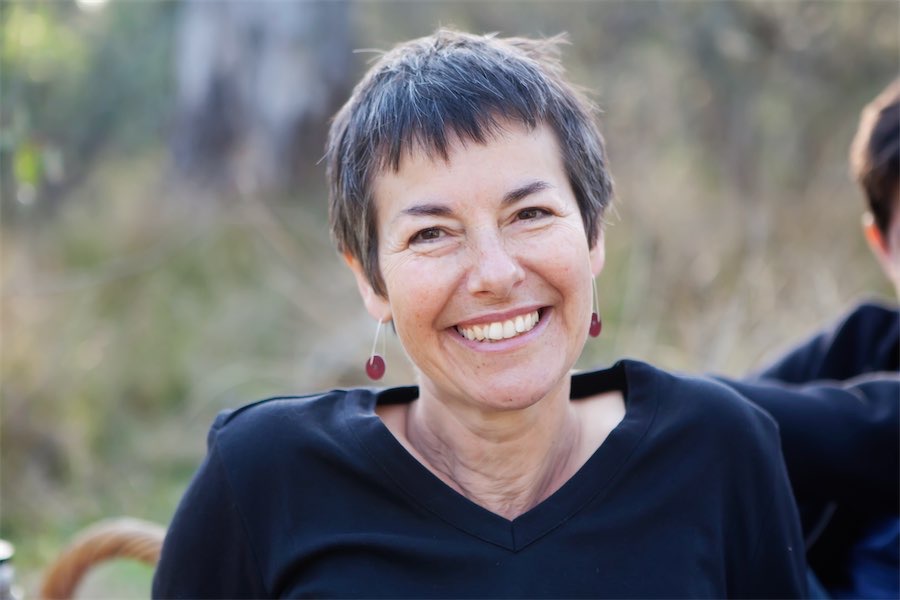
Jane Goffman… “Really important to put public toilets where there are eyes on the street.”
DICKSON
People are just having to ‘make do’, says convenor
DICKSON Residents Group has urged the ACT government to build a public toilet as part of its submission during the public consultation period for the Woolley Street upgrades.
While Dickson has a public toilet facility on Cowper Street, opposite Dickson Aquatic Centre, practising town planner and Dickson Residents Group convenor Jane Goffman says there’s a need for public toilets to be provided in a better location such as near the interchange.
The bus interchange has no public toilets at all and is a long distance away from the Cowper Street toilet block if someone is at the interchange and needs to use them, she says.
“As far as I know, every other bus interchange does have public toilets so it’s really bizarre that Dickson doesn’t,” she says.
“Without a toilet facility there, it means that if somebody is sitting and waiting for a while for a bus to come, it can become a real problem, especially if they’re older or they have a small child.
“Then if they walk along Woolley Street trying to find a toilet, there’s nothing there, either.”
Jane says people are often forced to hike over to McDonald’s or the library but both are meant for people who are actually using those facilities or for paying customers.
“It’s no good if they’re students because they may not have any money to go in and buy a cup of coffee and sit there. It really creates problems for people,” she says.
“The trend to strip out toilet facilities operates to privatise, by cost shifting to the private sector what was originally a government-run service.
“The big problem with doing that is it excludes anyone who can’t afford to pay to enter or feels uncomfortable entering a premises such as a pub, and many restaurants and cafes are closed at times when someone might be trying to find a toilet [such as] late at night, early in the morning or on their way home from work.”
The residents group would like to see clean, safe, 24-hour toilet facilities built that are not outsourced to private operators.
If the ACT government is unwilling to provide toilets in the area (because of maintenance/cleaning or perceptions of safety), then the submission suggests that the toilets on Cowper Street be closed and that the government provide new ones in a better location that also serves passengers for the bus interchange.
It’s important for the facility to have good surveillance and not be tucked away in a dark place that could become dangerous to access, Jane says.
“[It’s] really important to put public toilets where there are eyes on the street,” she says.
“[However], the feedback we got with the project team working on the Woolley Street upgrade is that there’s a resistance by the government to putting in public toilets because they’re perceived as attracting undesirable behaviour.
“That’s really a denial of justice for people who are struggling or doing it tough.
“It seems like we’ve gone down the route of denying people services so that they have to just make do [but] that assumes that everybody is in the same boat.
“Public toilets serve the public as a whole, not just people sleeping rough or dealing with drug problems, so having safe, clean accessible public toilets benefits everyone and should be compulsory social infrastructure.”
But, even though they should be an essential social infrastructure, they are a subject that planners tend to shy away from, according to Jane.
Stripping them out of parks in the older parts of Canberra causes parents to avoid taking small children regularly to local playgrounds, she says.
“That’s a really negative pattern from an early childhood perspective,” she says.
“In my view the community should be demanding clean, safe public toilets with good surveillance at all the local shops, all the interchanges, all the sports grounds, and all neighbourhood parks with basic playgrounds.
“Those small playgrounds serve more than just children, they serve their carers who are often grandparents.
“If there’s nowhere convenient for people to relieve themselves they have only three options: to go in the bushes, rush off or not go at all.”

WATSON
No toilets, so people shop elsewhere
THE absence of a public toilet at Watson shops has meant that residents in the suburb are forced to go to other places to do their shopping, says the head of the Watson Community Council’s planning working group, Simon Clarke.
“Watson is a suburb in transition. It’s a mixture of people who have been here since the suburb was established in the 60s and early 70s and that’s slowly been superseded by young families with children,” he says.
“Both of them are of an age and a family structure that needs toilets.
“When you get older you need a toilet available, when you’ve got young children you need a toilet available.
“Through the association I’ve had a number of older residents saying that they feel constrained coming out here and they now prefer to go to Dickson because there are public toilets there.”
Simon believes that public toilets should be a human right in civilised countries such as Australia and can’t see why a busy centre with lots of businesses and services, like Watson, wouldn’t have a public toilet.
“In a space like this, there should be one. With a school, a doctor, supermarket, chemist, and more shops planned next to the childcare centre, you would think there would be a toilet,” he says.
“Watson has almost doubled in size in the last 20 years with all the development in new Watson [and] there’s a set of shops going to be built [next to the current shops], which will increase patronage again.”
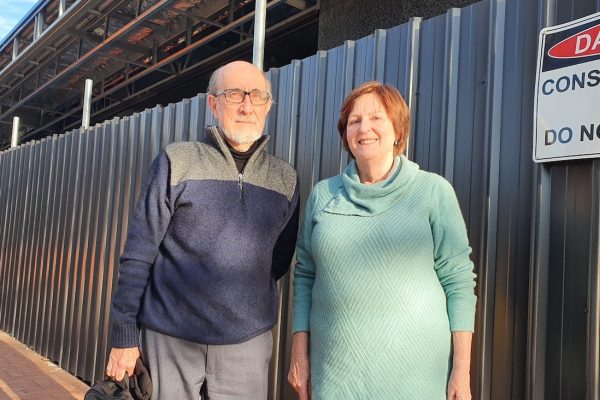
CURTIN
Public toilets lost to a private developer
THE Curtin Residents Association is concerned that plans to replace five toilets – three public, two private – with only two privately-owned toilets, won’t meet the needs of the community that uses Curtin shops.
The three public toilets were demolished more than a year ago after the ACT government forfeited the government-owned, public land that they were located on over to a developer to make way for a five-storey commercial/residential development (where the two private toilets were) that was expected to be completed last year.
Building is still underway and association president Chris Johnson is worried that once it’s complete, the two toilets being built as part of the development may not be available to the public, or may only be available for a limited amount of time rather than 24 hours.
According to the president, City Services Minister Chris Steel advised that under the agreement for the sale of the toilet block area, the developer is required to provide “like for like public toilet facilities”, however, Chris’ wife, Ann Parkinson, a member of the association, says they’ve asked to see the finalised plans and they’ve heard nothing.
“We can’t be sure because we haven’t seen the final plans,” she says.
The association would like some assurance from the minister and would like to know the nature of the agreement between the government and the developer, Chris says.
“We’ve had no sight of any agreements and we have no knowledge of legal provisions which would ensure that we do have a toilet,” he says.
The association is also concerned that cutting the toilet facilities down from three to two, will not be enough to meet the needs of the community.
After being promised “like for like” facilities, Chris says they’ve never had a justification why three goes down to two.
The only response they had was from Minister Steel, who said that it was determined by officers of the Transport Canberra and City Services directorate that two will be enough, according to Chris.
“About four times a year we have a fair a day on the weekend and a hundred people at a time will come and bring their kids and spend an hour or so there and these events also require good toilet facilities,” Chris says.
“Three was just enough, two will make a problem.”
The development was pitched as a way to bring more people to the shopping centre, so Chris believes they need more toilets, not less.
Currently there are temporary toilets in the carpark at the centre and when one of them sometimes breaks down, Chris says it causes a queue of people waiting.
Chris also raised concerns around them being privately-owned, asking who they contact if they need to talk to someone about the toilets.
“Once it goes private you can’t even use Fix My Street as a way to complain,” he says.
“Whether it is for Canberra’s ageing but active population, or for our youngest new people, or just for everyone – public life requires public toilets. We all have to go sometimes.
“The cost of providing toilets and keeping them clean and maintained is just part of the cost of being a civilised city, and it should not be skimped on. “Disregarding the needs of people who actually use public spaces is just bad policy. Having no toilets will reduce active use of spaces.”
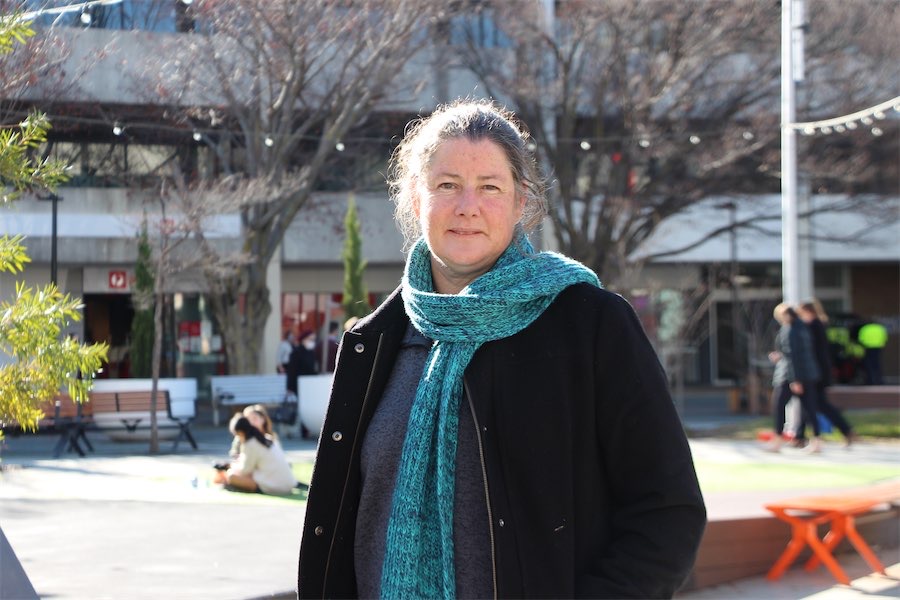
WODEN VALLEY
Toilets help people take part in the community
Woden Valley Community Council president Fiona Carrick says there should be public toilets so that people can feel confident about participating in the community.
Fiona’s lived in the area for more than 50 years and often gets teary by the ACT government’s “planning mess” in the south, particularly in Woden’s centre.
“Where’s our community centre, where’s our indoor sports stadium, where’s our arts centre, our pool’s on it’s way out,” she says.
For Fiona, it’s about wholesome planning and ideally, she’d like to see a community centre and art centre built into one of the buildings bordering Woden Town Square, which would have a public toilet in it, activating the area through activities, events and facilities.
“The new light rail/ bus interchange in Woden must have public toilets for people to feel comfortable to use public transport, [too],” she says.
“The bus interchange is the major transport hub for Canberra’s south. All the buses hub in here and that’s where the Woden tram will end up.
“So for people to feel comfortable to use public transport they need to be able to access public toilets and they need to be close to the bus interchange because people won’t be running up the stairs from Callum Street into Westfield to go to the toilet and then back and missing connections particularly on your way home when there’s less frequent buses going to the suburban runs.
“It’s too risky to miss your bus and then you have to wait too long for the next one.”
People want public toilets, Fiona says, and while the bus interchange is a big issue people also want public toilets at local shops where the main hubs are.
“For example, Farrer has a new playground [and] where you have a playground and the shops connected, you need public toilets because you’re asking people to participate in the community,” she says.
“To be inclusive, people need to be confident that they can go to the toilet to be able to participate in the community.”
Torrens playground has also had an upgrade but there’s no toilets there either and Fiona says people are asking cafe owners to use their toilets.
“They’re not customers of the cafe, they’re the public using the playground yet they’ve got nowhere to go to the toilet so they’re asking the cafes if they can use their toilets and the cafes aren’t pleased about that,” she says.
“It’s not fair for local cafes to have to provide toilets for people using playgrounds.
Lyons shops is another shopping centre that Fiona says could benefit from toilet facilities and a playground.
Fiona understands it’s not possible to have toilets at every single local playground in a greenbelt but where there’s playgrounds at shops and main community hubs, there should be access to toilets, she says. In Canberra’s south, there’s a need for public toilets in Farrer, Torrens, Lyons, at the Woden Town Square and the incoming light rail and bus interchange in Woden, according to the Woden Valley Community Council.
HERE ARE SOME OTHER SUBURBS WHERE YOU WON’T FIND A PUBLIC TOILET
- Duffy shops is in the process of being “revitalised” by the ACT government and while it will receive footpath upgrades, new seating and new trees, plans don’t include public toilet facilities.
- Even though Crace shops have a grocery store, medical centre, pharmacy, cafe, pub, beautician, hairdresser, physiotherapist and gym, there is no public-toilet facility. There is, however, public toilet facilities at the recreation park about a kilometre away.
- Florey shops is another neighbourhood shopping centre without public-toilet facilities.
- Parents with young children might be forced to cut their trip short to the developer-built Denman Prospect Ridgeline Park playground when they discover they’re without toilets.
- Hackett shops is another neighbourhood shopping centre that doesn’t have any public toilets. Phillip Aerts is currently leading a petition, sponsored by Greens MLA Rebecca Vassarotti in the ACT Legislative Assembly, calling for public toilets to be built at the shops. The petition ends in October. https://epetitions.act.gov.au/CurrentEPetition.aspx?PetId=169&lIndex=-1
- Same with Franklin. While it has about eight stores, including a supermarket, cafe and pharmacy, there’s no toilet in sight.
Who can be trusted?
In a world of spin and confusion, there’s never been a more important time to support independent journalism in Canberra.
If you trust our work online and want to enforce the power of independent voices, I invite you to make a small contribution.
Every dollar of support is invested back into our journalism to help keep citynews.com.au strong and free.
Thank you,
Ian Meikle, editor











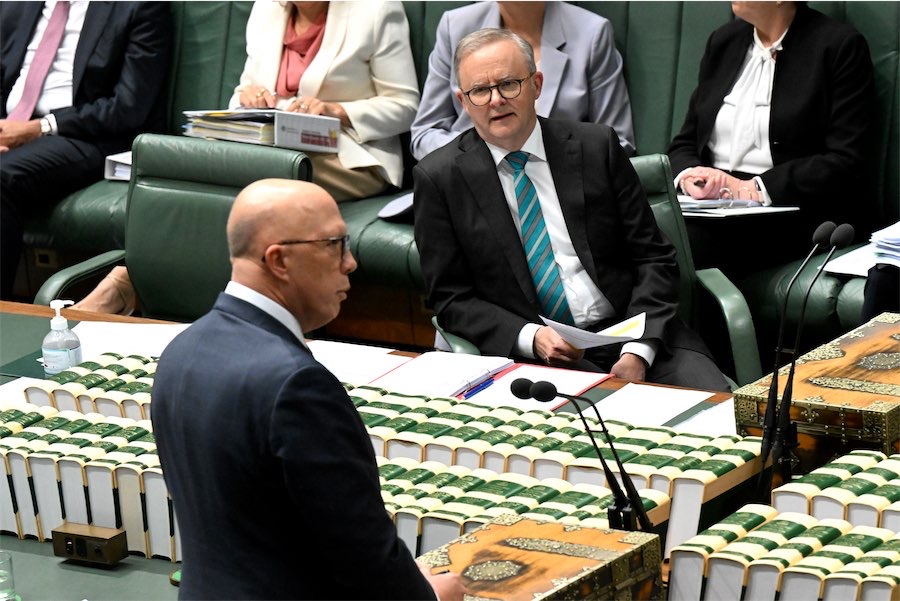

Leave a Reply